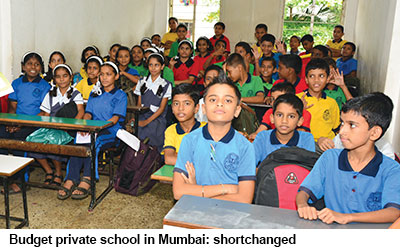 Private independent schools in Maharashtra which have dutifully admitted poor children in their neighbourhoods into primary/elementary school (classes I-VIII) under s.12 (1) (c) of the Right of Children to Free and Compulsory Education (RTE) Act, 2009, say that the state government owes them Rs.900 crore.
Private independent schools in Maharashtra which have dutifully admitted poor children in their neighbourhoods into primary/elementary school (classes I-VIII) under s.12 (1) (c) of the Right of Children to Free and Compulsory Education (RTE) Act, 2009, say that the state government owes them Rs.900 crore.
Under this provision, private (non-minority) schools are obliged to reserve 25 percent of capacity in class I for poor children in their neighbourhoods and retain them — free-of-charge — until completion of elementary education (class VIII). Under s.12 (2) of the RTE Act, to compensate private schools that admit poor students selected under the state/municipal government’s lottery system, the state government is obliged to partially reimburse them the expense towards educating students admitted under s.12 (1) (c) by paying them the equivalent of per-child expense it incurs in its own government schools. Over 70 percent of Maharashtra’s 11,000 independent schools — including 8,000 budget private, i.e, low-cost affordable schools — say they have either not received any reimbursement or have been paid partial dues by the state government’s school education department for the academic years 2017-18 and 2018-19.
The Maharashtra state government spends Rs.17,670 per student per year in public (government) schools. Therefore, even under the iniquitous s.12 (2) formula, the state government would need to budget Rs.1,136 crore annually for children from 80,000 poor households admitted into class I of private independent schools, and for children admitted in previous years and retained until completion of class VIII. However, this amount calculated by the Pune/Aurangabad-based Independent English Schools Association (IESA, estb. 2014) is contested by the education ministry.
According to a ministry spokesperson, the annual payout of the state government under s.12 (2) is Rs.150-180 crore and the pending reimbursement amount is Rs.336 crore of which half was reimbursed for the year 2018-19 and another Rs.90 crore was paid in February this year. Education ministry officials attribute the huge discrepancy between the two calculuses to private school managements unable to provide proof of s.12 (1) (c) admissions and compliance with the provisions of s.19 (which prescribes minimal infrastructure norms from which iniquitously, government schools are exempt), under rules written by the state government.
IESA and associations representing 14,000 budget private schools (BPS) across the state have repeatedly petitioned the courts to direct the government to pay them their s.12 (2) reimbursement dues. On February 12, 2019, the Aurangabad bench of the Bombay high court passed an order directing the state government to clear these dues. But neither the previous BJP/Sena nor its successor Shiv Sena-Congress-NCP Maharashtra Aghadi coalition have complied with the high court order.
The huge discrepancy between the amount claimed by private schools as pending dues under s.12 (2) and the government estimate, is also the outcome of numerous independent (including BPS) schools having admitted poor neighbourhood children into pre-primary classes. Under a proviso embedded in s.12 (1) (c), schools dispensing pre-primary education are obliged to start earlier and reserve 25 percent capacity in preschools for poor neighbourhood children. In 2012, the state government directed such private schools to admit children into pre-primary classes on assurance of reimbursement under s.12 (2).
However subsequently, the cash-strapped state government reneged on this promise by arguing that the RTE Act is applicable to children in the 6-14 years age group and not younger pupils. Pulled up by a division bench of the Bombay high court (April 28, 2015) for “shirking their responsibilities by contending that they are under no obligation towards pre-primary education,” the erstwhile BJP/Sena state government (voted out of office in early 2020) issued a government notification (April 30, 2015) cancelling all pre-primary admissions made in the academic years 2012-15. The state government has filed an appeal in the Supreme Court against the high court order, awaiting final adjudication.
“Apart from s.12 (1) (c) admissions, private schools have been experiencing high inflow of children being pulled out of government schools by parents prepared to pay affordable tuition fees to access better education for their children. But despite making up for the government’s failure to provide acceptable quality education, private independent especially budget private schools, are being harassed and persecuted by state and local governments. Instead of mending its own schools and improving them, successive governments are bullying private schools and forcing an increasing number of them to close down by imposing quotas and refusing to pay for them,” laments Rajendra Singh, president of IESA.
Slowly but surely through myopic and mindless tinkering with the state’s K-12 education system, Maharashtra’s populist politicians who seem to have no regard for the sanctity of contract, are blighting the future of children from the state’s estimated 15 million socio-economically under-privileged households.
Dipta Joshi (Mumbai)




























